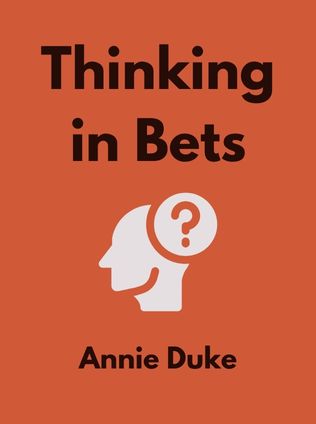
Thinking in Bets
Making Smarter Decisions When You Don't Have All the Facts
By Annie Duke
Published 02/2018
About the Author
Annie Duke, a former professional poker player, turned her experiences at the poker table into a guide for making better decisions in life and business. With a background in cognitive psychology, Duke brings a unique perspective to understanding risk, probability, and decision-making. Her book Thinking in Bets combines insights from her poker career with scientific research to help readers make more rational and effective choices.
Main Idea
The core message of Thinking in Bets is that by viewing decisions as bets, we can improve our decision-making process. This involves being aware of the risks and uncertainties inherent in every choice and learning from the outcomes of our decisions. Duke emphasizes the importance of well-informed beliefs, learning from past outcomes, and surrounding oneself with a supportive group for feedback.
Table of Contents
- Introduction: Making Smarter Decisions
- Vetting Your Beliefs
- Learning From Outcomes
- Embrace Uncertainty
- Avoid Resulting
- Separate Luck From Skill
- Look Into the Future
- Relying on a Group to Hold You Accountable
- Forming Decision Groups
- Conclusion: Improving Decision Quality
Introduction: Making Smarter Decisions
Every decision involves risk, but we often make choices impulsively or based on biases. Duke suggests that thinking of each decision as a bet can help us weigh the risks and benefits more carefully. By doing so, we become more rational and flexible in our thinking.
“What if we worked on keeping risk at the forefront of our minds when we made decisions?” — Annie Duke
Vetting Your Beliefs
Our decisions are driven by our beliefs, but these beliefs can often be flawed. Duke highlights the importance of questioning and vetting our beliefs to ensure they are based on accurate information. She explains that we tend to accept information that supports our existing beliefs and disregard contradictory evidence, a process known as motivated reasoning.
To combat this, Duke suggests imagining that each belief we hold must be backed by a bet. This approach forces us to scrutinize our beliefs more critically and reduces the influence of biases.
“Making a habit of interrogating your beliefs is essential to making good decisions.” — Annie Duke
Learning From Outcomes
Improving decision-making requires learning from past decisions. Duke emphasizes the need to embrace uncertainty and avoid black-and-white thinking. Decisions are rarely entirely right or wrong; they often fall somewhere in between. By analyzing the factors that led to each outcome, we can better understand the quality of our decisions.
“You won’t always be right, but you can always be working toward objectivity.” — Annie Duke
- Consider why a business decision led to a loss, taking into account external factors and internal processes.
- Analyze a successful project to identify the key decisions that contributed to its success.
Embrace Uncertainty
Uncertainty is a constant in decision-making. Duke advises that we should not be paralyzed by uncertainty but rather use it to our advantage. By accepting that we cannot know everything, we can make more informed and flexible decisions. This involves evaluating the probability of various outcomes and preparing for different scenarios.
- When deciding whether to invest in a new venture, consider both the potential rewards and the risks involved.
- Before making a major life decision, such as relocating, weigh the benefits and possible challenges.
Avoid Resulting
Resulting is the practice of judging a decision based solely on its outcome. Duke warns against this because it can lead to faulty conclusions. A good decision-making process can lead to a bad outcome due to factors beyond our control, such as luck. Therefore, it is crucial to focus on the process rather than the outcome.
Sign up for FREE and get access to 1,400+ books summaries.
You May Also Like
The Subtle Art of Not Giving a F*ck
A Counterintuitive Approach to Living a Good Life
By Mark MansonRich Dad Poor Dad
What the Rich Teach Their Kids About Money - That the Poor and Middle Class Do Not!
By Robert T. KiyosakiHow To Win Friends and Influence People
The All-Time Classic Manual Of People Skills
By Dale CarnegieFreakonomics
A Rogue Economist Explores the Hidden Side of Everything
By Steven D. Levitt and Stephen J. Dubner



















